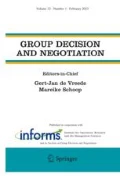Abstract
Multi-attribute negotiation is an important mechanism for distributed decision makers to reach agreements in real-world situations. It allows the possibility of reaching “win-win” solutions for both parties, who trade off different attributes in a solution. Existing research on multi-attribute negotiations has mainly focused on the situations when negotiation parties have complete information about each other's preference. This paper presents a model with incomplete information, while considering Pareto-efficiency and computational efficiency. A non-biased mediator, who applies query learning to maintain near Pareto-efficiency without heavy computation, is adopted in the model. In addition, the mediating mechanism proposed in the model overcomes the difficulty of preference elicitation which usually arises in the preliminary step of a multi-attribute negotiation. Our model also reduces the negotiation complexity by decomposing the original n-dimensional negotiation space into a sequence of negotiation base lines. Agents can negotiate upon a base line with rather simple strategies. The experimental results show that near Pareto-efficient agreements can be reached effectively.
Similar content being viewed by others
References
Bac, M. and H. Raff (1996). “Issue-by-Issue Negotiations: The Role of Information and Time Preference,” Games and Economic Behavior 13, 125–134.
Blum, A., J. Jackson, T. Sandholm, and M. Zinkevich (2004). “Preference Elicitation and Query Learning,” Journal of Machine Learning Research 5, 649–667.
Busch, L.-A. and I. J. Horstmann (1997). “Endogenous Incomplete Contracts: A Bargaining Approach,” Games and Economic Behavior 19, 144–148.
Busch, L.-A. and I. J. Horstmann (1999). “Signaling Via an Agenda in Multi-Issue Bargaining with Incomplete Information,” Economic Theory 13, 561–575.
Chen, L. and Pu, P. (2004). “Survey of Preference Elicitation Methods”, EPFL Technical Report IC/2004/67, Switzerland.
Ehtamo, H., R. P. Hamalainen, P. Heiskanen, J. Teich, M. Verkama, and S. Zionts (1999). “Generating Pareto Solutions in a Two-Party Setting: Constraint Proposal Methods,” Management Science 45, 1697–1709.
Faratin, P., C. Sierra, and N. R. Jennings (1998). “Negotiation Decision Functions for Autonomous Agents,” International Journal of Robotics and Autonomous Systems 24, 159–182.
Faratin, P., C. Sierra, and N. R. Jennings (2000). “Using Similarity Criteria to Make Negotiation Trade-Offs,” in the Proceeding of the 4th International Conference on Multi-Agent Systems, Boston, USA. 119–126.
Fatima, S., M. J. Wooldridge, and N. R. Jennings (2004). “An Agenda-Based Framework for Multi-Issue Negotiation,” Artificial Intelligence 152, 1–45.
Fatima, S., M. J. Wooldridge, and N. R. Jennings (2004). “Optimal Negotiation of Multiple issues in incomplete Information Settings,” In the Proceeding of the 3rd International Conference on Autonomous Agents and Multi-Agent Systems, New York, USA., 1080–1087.
Hudson, B. and T. Sandholm (2004). “Effectiveness of Query Types and Policies for Preference Elicitation in Combinatorial Auctions,” In the Proceeding of the 3rd International Conference on Autonomous Agents and Multi-Agent Systems, New York, USA. , 386–393.
Kalai, E. (1977). “Proportional Solutions to Bargaining Situations: Intertemporal Utility Comparisons,” Econometrica 45, 1623–1630.
Klein, M., P. Faratin, H. Sayama, and Y. Bar-Yam (2003). “Negotiating Complex Contracts,” Group Decision and Negotiation 12, 111–125.
Lai, G., C. Li, K. Sycara, and J. Giampapa (2004). “Literature review of multi-attribute negotiations”, Technical Report, CMU-RI-TR-04–66, Carnegie Mellon University, Pittsburgh, USA.
Lang, K. and R. W. Rosenthal (2001). “Bargaining Piecemeal or All at Once,” The Economic Journal 111, 526–540.
Li, C. and G. Tesauro (2003). “A strategic Decision Model for Multi-attribute Bilateral Negotiation with Alternating Offers,” In the Proceeding of the ACM Conference on Electronic Commerce 2003, 208–209.
Li, C., J. Giampapa, and K. Sycara (2006). “Bilateral Negotiation Decisions with Uncertain Dynamic Outside Options,” IEEE Transactions on Systems, Man, and Cybernetics, Part C: Special Issue on Game-Theoretic Analysis and Stochastic Simulation of Negotiation Agents 36(1), 31–44.
Nash, J. (1950). “The Bargaining Problem,” Econometrica 18, 155–162.
Rubinstein, A. (1982). “Perfect Equilibrium in a Bargaining Model,” Econometrica 50, 97–109.
Santi, P., V. Conitzer and T. Sandholm (2004). “Towards a Characterization of Polynomial Preference Elicitation with Value Queries in Combinatorial Auctions,” In the Proceedings of the Conference on Computational Learning Theory, Washington DC, USA. , 1–16.
Sycara, K. (1990a). “Persuasive Argumentation in Negotiation,” Theory and Decision 28, 203–242.
Sycara, K. (1990b). “Negotiation Planning: An AI Approach,” European Journal of Operational Research 46, 216–234.
Sycara, K. (1991). “Problem Restructuring in Negotiation,” Management Science 37, 1248–1268.
Zeng, D. and K. Sycara (1998). “Bayesian Learning in Negotiation,” International Journal of Human-Computer Studies 48, 125–141.
Author information
Authors and Affiliations
Corresponding author
Rights and permissions
About this article
Cite this article
Lai, G., Li, C. & Sycara, K. Efficient Multi-Attribute Negotiation with Incomplete Information. Group Decis Negot 15, 511–528 (2006). https://doi.org/10.1007/s10726-006-9041-y
Published:
Issue Date:
DOI: https://doi.org/10.1007/s10726-006-9041-y




